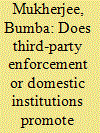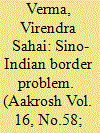|
|
|
Sort Order |
|
|
|
Items / Page
|
|
|
|
|
|
|
| Srl | Item |
| 1 |
ID:
074658


|
|
|
|
|
| Publication |
2006.
|
| Summary/Abstract |
What causes peaceful resolution of civil wars to endure rather than to collapse into renewed fighting? Existing studies predict that third-party peace enforcement by the United Nations (UN) or domestic institutions such as democracy, parliamentary, and presidential institutions and the proportional representation (PR) electoral system promotes enduring peace in societies that have emerged from a civil war. However, extant empirical works test the effect of third-party enforcement but not the impact of domestic institutions on peace after civil wars. Hence, I test the impact of democracy, presidential, and parliamentary institutions, electoral systems-PR and majoritarian-and third-party enforcement by the UN on the durability of peace after termination of civil wars. Results from a bootstrapped Weibull duration model show that democracy and the PR electoral system significantly reduces the likelihood that civil war may recur, but that third-party enforcement by the UN does not have a significant effect on the hazard rate of peace spells. A brief case study analysis of recent attempts to build democratic institutions in Cambodia and Kosovo by the international community also supports the claims posited in this article.
|
|
|
|
|
|
|
|
|
|
|
|
|
|
|
|
| 2 |
ID:
178687


|
|
|
|
|
| Summary/Abstract |
This article introduces the Peaceful Resolution of Territorial Disputes (PRTD) dataset, covering all interstate territorial disputes (1945–2015). Our dataset captures proposals for the peaceful resolution of territorial disputes made by states involved in territorial claims at the disputant-year level. These proposals provide a concrete measure of changing state preferences toward negotiations, non-binding, and binding third-party dispute resolution methods over time. In contrast to existing attempt-level data, the monadic panel design of the dataset captures not only actual attempts at peaceful resolution – the result of an agreement between disputants – but also proposals for methods that did not occur but were preferred at a particular time point. Our dataset allows for robust and generalizable quantitative analyses of the peaceful resolution of territorial disputes that are sensitive to temporal, regional, claim-based, and state-level trends. To demonstrate the utility of our dataset, we use hybrid logistic regression to examine the determinants of binding PRTD proposals. Over-time changes in characteristics such as regime type and treaty commitments influence attitudes toward binding settlement methods differently than disputant-level measurements. We also show that time has a distinctively non-linear effect.
|
|
|
|
|
|
|
|
|
|
|
|
|
|
|
|
| 3 |
ID:
160525


|
|
|
|
|
| Summary/Abstract |
Does individual-level exposure to political violence prompt conciliatory attitudes? Does the answer vary by phase of conflict? The study uses longitudinal primary datasets to test the hypothesis that conflict-related experiences impact conciliation. Data were collected from Israeli Jews, Palestinians, and Protestants and Catholics in Northern Ireland. Across both contexts, and among both parties to each conflict, psychological distress and threat perceptions had a polarizing effect on conciliatory preferences. The study highlights that experiences of political violence are potentially a crucial source of psychological distress, and consequently, a continuing barrier to peace. This has implications in peacemaking, implying that alongside removing the real threat of violence, peacemakers must also work toward the social and political inclusion of those most affected by previous violence.
|
|
|
|
|
|
|
|
|
|
|
|
|
|
|
|
| 4 |
ID:
118113


|
|
|
| 5 |
ID:
074831


|
|
|
|
|
| Publication |
2006.
|
| Summary/Abstract |
This paper develops a bargaining model that explains why political power-sharing agreements lead to peaceful resolution of civil wars between governments and insurgents in some cases, but not others. The model predicts that if the civil war ends in a military stalemate, the government uses its offer of a political power-sharing agreement to the insurgents as a tool to misrepresent private information about its military capacity and defeat the insurgency. This exacerbates commitment problems, increases the degree of support that insurgent leaders receive from their civilian supporters and consequently increases the likelihood of recurrence of civil war. Conversely, the model shows that when the war ends in a decisive military victory for the government or the insurgents, the offer of a political power-sharing agreement reduces the degree of support that insurgent leaders get from their civilian supporters and increases the costs of fighting for the insurgents. Hence, after a decisive military victory insurgents have incentives to accept the political power-sharing agreement and not revert to fighting. Results from Cox Proportional Hazard models estimated on a data set of 111 civil wars (1944-1999) provide robust statistical support for the model's predictions.
|
|
|
|
|
|
|
|
|
|
|
|
|
|
|
|
|
|
|
|
|